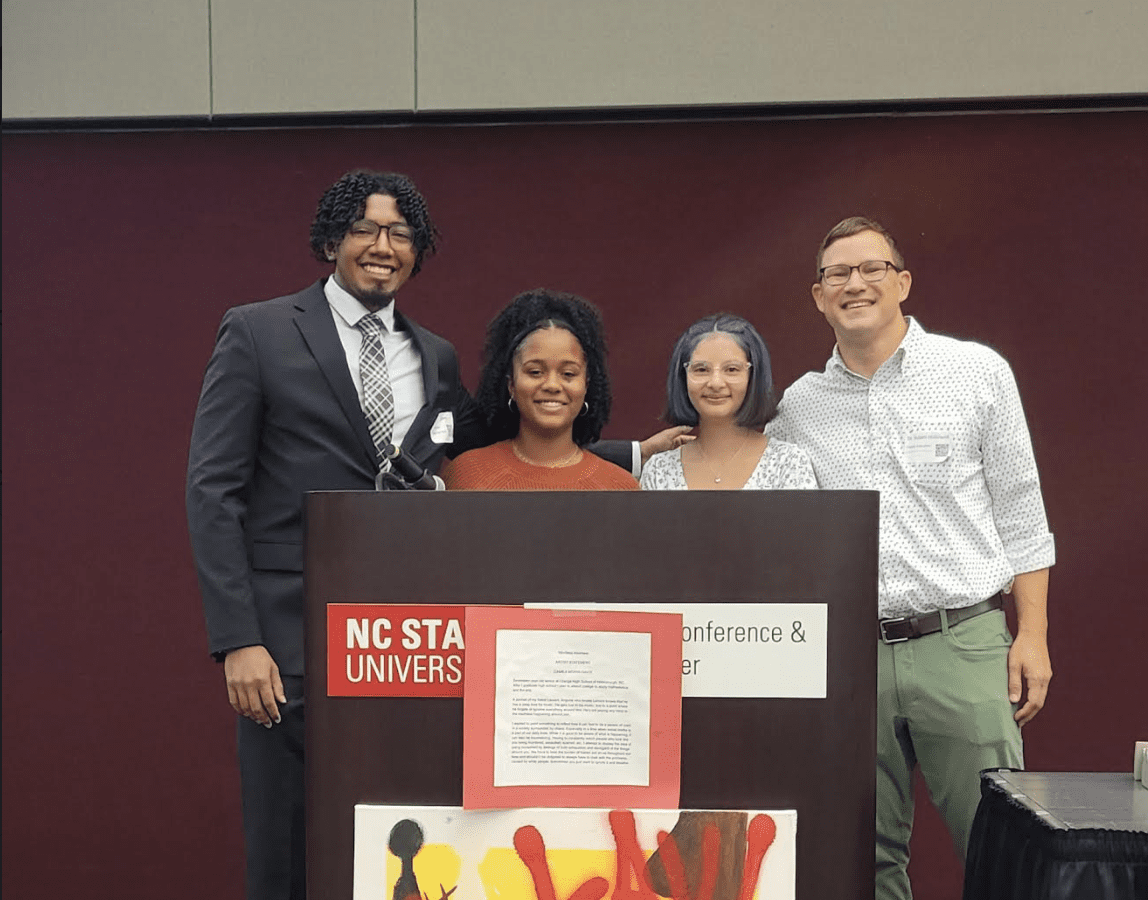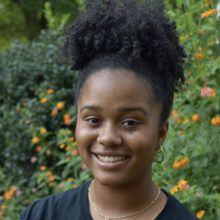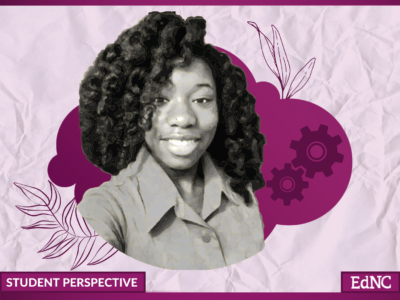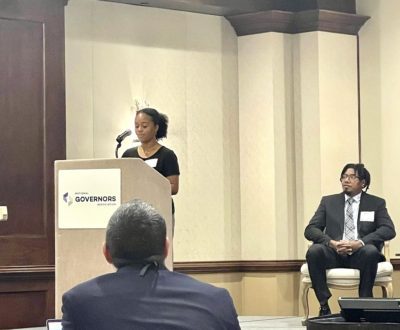
|
|
Editor’s Note: At this year’s Color of Education Summit, two Orange County Schools students took the stage alongside their teacher, Xavier Adams, to give a “talk to teachers.” Orange High School senior Judith Rodriguez and junior Tia Hilber leaned on James Baldwin’s well-known “A Talk To Teachers” and presented student perspectives to the current conversations around how history is taught in schools. These are Hilber’s remarks.
Good morning everyone! My name is Tia Hilber, and I am a junior at Orange High School. I am very grateful for this opportunity to be speaking here today. Prior to me speaking, Adam has given some incredible information on a man named James Baldwin — a man that I will forever see as an inspiration as I continue to move forward in life.
James Baldwin once gave a very important speech called, “A Talk to Teachers.” Within this speech, I have found a quote that I deeply connect with. The quote goes, “You (teachers and educators) must understand that in the attempt to correct so many generations of bad faith and cruelty, when it is operating not only in the classroom but in society, you will meet the most fantastic, the most brutal, and the most determined resistance. There is no point in pretending that this won’t happen.”
From this one quote, I have formulated my own “Talk to Teachers.” Just as James Baldwin gave a speech on his opinions of the responsibility of educators, I would like to add a little of my own. I have titled mine, “A Talk To Teachers: Why I Need You To Be Brave.”
The issues
My grandma always said, “If the American history that was taught in schools was truthful and didn’t favor sides then the world would be a lot better off.” I agree with her statement in every way. The American history that is told in schools isn’t how things really went down. In my elementary and middle school years, countless crucial details were left out of what truly happened.
The only sides of Black history that were learned about in depth was slavery and a few select civil rights leaders. Even then, their works weren’t fully shared. The only times Native Americans were even mentioned was at the supposed peaceful Thanksgiving dinner in 1621. Yet, this version of history left out the incredible civilizations and cultures that were built here long before settlers came from the Old World. These are just two examples of times where general American history curriculums have glazed over the histories and pasts of cultures of color. This is information that is crucial to the way students will go on to view others as they move throughout life.
Glazing over these important times in history can often lead to misconceptions and misinformation that plagues our society today. For example, people misunderstand the Black Lives Matter demonstrations in 2020 because they do not understand the history behind it. The reasoning behind these demonstrations can only truly be seen when you learn the years and years that Black people have suffered within policing systems and systemic racism, dating farther back to when slave patrols started the long history of police brutality, which once worked hand-in-hand with slavery.
Another event that had sparked controversy in recent years was the numerous amount of Native American demonstrations about the Dakota Access Pipeline that was built through their land. A 1,172-mile long underground pipeline that had the potential to transport hundreds of thousands of barrels of crude oil everyday. For some people, the perceived economic benefits of this pipeline would be positive. This project posed serious threats to the water supply on Native American reserves and the religious lands of tribes. This is not the first time that Native American lands and well-being have been threatened. The history of the disrespect that these groups of people have faced dates back to when settlers first arrived and claimed America as their own — completely disregarding the people who already inhabited these supposedly “new” lands. These are just two examples of the immense historical backgrounds in American history that present-day events can have.
Now, people can form whatever opinions they’d like on these events. But if these opinions are based on misinformation or lack of education, it can lead to hatred or discrimination. In one of my classes last year, we were having a debate about different historical events. It eventually came down to the question of, “Why did the civil rights movement occur?” One of the students in my class raised his hand and confidently answered, “Because some people can never be happy with what they have.” From my understanding, he meant that Black people were only protesting because they couldn’t just be happy with the rights that they had been given and come to terms with the discrimination that they faced, the rights that were significantly less than their white counterparts at this time. This answer absolutely stunned me. The civil rights movement is a time that I see as a crucial part of history filled with incredibly brave people. And this boy’s answer signaled to me that maybe he hadn’t received the right amount of education on this time period.
This is just one example of the many times that I have encountered opinions from people my age and older that are seemingly based on misinformation. And it’s an experience that almost every person of color will go through throughout their lives. This lack of education on the numerous cultures in the U.S. creates a less empathetic society. When people don’t know the history that other people go through, it makes it harder for them to relate to the situations of others. This lack of understanding has the potential to harbor an unwelcoming environment within schools, workplaces, and even public settings. It is a problem that has troubled society for many decades, but now we have a chance to really make a change.
The influence
Talking about important topics such as race, sexuality, and ethnicity have become increasingly controversial in today’s society and can pose the threat of backlash. This backlash is what James Baldwin was warning of in his quote. He specifically focuses on the important role of educators within changing the problems and the bravery it takes to do so. This is why I have titled my speech, “Why I need you to be brave.” Educators and teachers play one of the most important roles in promoting inclusivity and diversity within the history taught in schools. And to do so, they must be willing to push through the controversy and fight for what is right.
A modern day example being conflicts surrounding the teachings of critical race theory. Critical race theory can be defined as an examination of how race and ethnicity play into politics, social events, lawmaking, and much more. In my opinion, it is a very important piece of education, because it can provide insight into why the world is how it is. The knowledge that critical race theory instills is extremely helpful for everyone as they navigate through life. Yet, some people may not agree. The call for the banning of critical race theory in school curricula has been incredibly strong in most recent years. Yet educators all over the United States are standing their ground to see a change within their school systems. They’re fighting for the rights of students to learn about how they fit into the world and how it has developed.
To see a significant change in society, we must first push for change within our classrooms and education systems. This change must start with the willingness of teachers and educators to take a stand. This means that the bravery that it takes to stand up for these issues is immense yet incredibly necessary. Whether it’s outwardly voicing your opinions on why you believe what is being taught is important, or even giving your students a platform to express their opinion on the subject matter. Both can show students that you truly care for their education and well-being and start the cycle of change within society.
Educating the newer generations on more topics, such as the cultures within American history, builds a more empathetic and caring generation for the future. Whether it’s fighting for more representation in the American history curriculum, classes that teach about specific cultures, or advocating for the removal of history that may not be truthful. All of these options can help to correct the cycle of misinformation and lack of education on important issues within schools.
The students sitting in classrooms today will one day be the future leaders of the world. Whether it’s activists, presidents, or lawmakers. There is a chance that they will have to make important decisions for the good of other people. Even if they aren’t, the empathy and background knowledge that they learn about different people and cultures will undoubtedly help them move forward in life. As teachers, you have the ability to impact this cycle of wrongdoing by being brave.
Thank you, and I hope everyone has a wonderful day.





